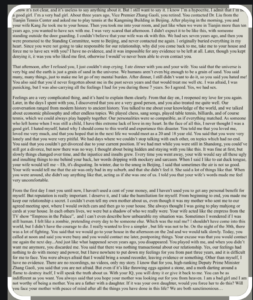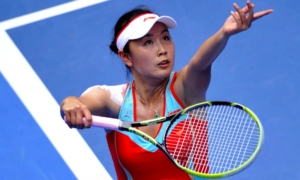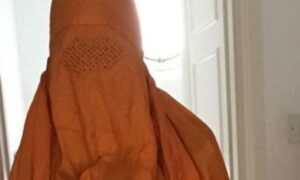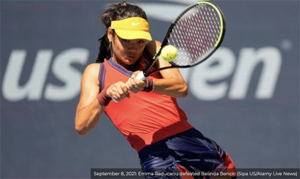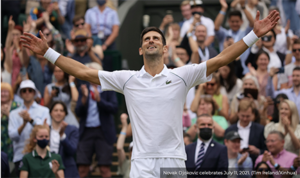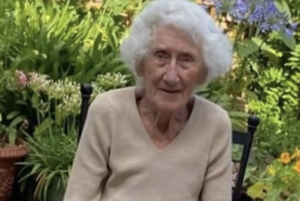The Novak Djokovic debacle is finally done and dusted. He is out — deported, visa revoked for the second time, with the threat of being barred from entering Australia for the next three years.
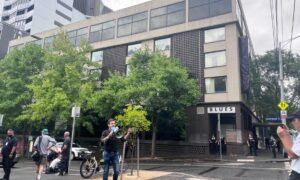
The Park Hotel on Friday in Melbourne where Novak Djokovic is being detained at the state-run quarantine facility
In the words of the legendary Aussie tennis player, Rod Laver, in relation to the current Novak Djokovic debacle: “If he’s got a reason then . . . we should know it. Yes, you’re a great player and you’ve performed and won so many tournaments, so it can’t be physical. So what is the problem?”
On 2 nd November, the former tennis star and two times Grand Slam doubles champion, 35-year-old Peng Shuai, dropped a bombshell via the Chinese Twitter-style platform, Weibo, in a social media post in which she accuses former Vice Premier, 75-year-old Zhang Gaoli, of coercing her into having sex “about three years ago”. Read More
Yep, that’s me — under what’s known in English as a “pinhole shuttlecock burqa”.
I bought the burqa some 20 years ago at the market in Peshawar. Most of the population of this city in Pakistan, close to the border with Afghanistan, are ethnic Pashtuns. In those days, what few white women visited the town could freely wander round the market. I say freely, but we did have a male escort, a burly Pashtun who was visibly embarrassed when I asked him to negotiate for that burqa, alongside an Afghan tea cosy. Peshawar seemed impossibly exciting then, like something out of the Wild West.
When we first arrived, I was horrified by the sudden sight of women in burqas like this. Those who weren’t out shopping were being jolted around, bumping shoulders in the back of battered Suzuki jeeps, seemingly peering out at us. Their garb gave them an appearance of capture, of strange exotic creatures.
 “I’m going to treat this match as if it’s my last one because it’s arguably the most important of my career. I’ll be giving it all I have possibly got in the tank,” said Novak Djokovic before Sunday’s US Open final. Despite being overshadowed, unusually, by the Women’s Final, the Men’s Final was hugely significant.
“I’m going to treat this match as if it’s my last one because it’s arguably the most important of my career. I’ll be giving it all I have possibly got in the tank,” said Novak Djokovic before Sunday’s US Open final. Despite being overshadowed, unusually, by the Women’s Final, the Men’s Final was hugely significant.
Significant, because were he to have won, he would have been the first man since Australian “Rocket” Rod Laver to win the Calendar Slam, all four majors in the same year. “Rocket,” who achieved this in 1969 and is now 83, may live in Australia, but he flew in to New York to witness the occasion. 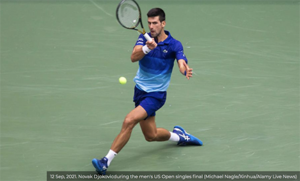
 This year is the summer of “staycations” and prices have rocketed in response to huge demand. A two-bedroom park lodge in Devon, for instance, can command £1,500 per week, perhaps even more for one with a sea view.
This year is the summer of “staycations” and prices have rocketed in response to huge demand. A two-bedroom park lodge in Devon, for instance, can command £1,500 per week, perhaps even more for one with a sea view.
So, an obvious question is, why not invest in a park lodge? Rent it out for the high season to cover costs and you get the rest of the year to enjoy what should essentially be a free holiday. And you can always sell up further down the line.
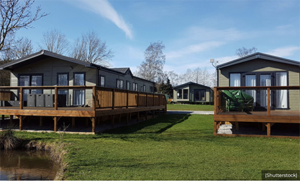 I first came across the world of park lodges when my friend Kirstie (not her real name) rang me to say she’d come across one with “an incredible sea view” in Devon. “The salesman is so helpful and charming. It’s really quick and easy to buy. He says I don’t need to use a lawyer as it’s just a chattel, like buying a car.” “How much?” I asked. “£225,000 for a 37-year-licence. But he’s really pushing me. He says someone else is interested.” Kirstie can be rather impulsive and this was worrying me. “Let me do some research,” I said.
I first came across the world of park lodges when my friend Kirstie (not her real name) rang me to say she’d come across one with “an incredible sea view” in Devon. “The salesman is so helpful and charming. It’s really quick and easy to buy. He says I don’t need to use a lawyer as it’s just a chattel, like buying a car.” “How much?” I asked. “£225,000 for a 37-year-licence. But he’s really pushing me. He says someone else is interested.” Kirstie can be rather impulsive and this was worrying me. “Let me do some research,” I said.
Last night, Emma Raducanu won the US Open Women’s singles title. The scoreline was 6-4, 6-3 which looks straightforward enough — except it was anything but.
At 18 years old, Raducanu is the youngest Grand Slam champion since Maria Sharapova in 2004. She is also the only qualifier, male or female, ever to win a Grand Slam.
In the final, she was pitted against another wunderkind, the Canadian Leylah Fernandez, who is just a few months older and has also enthralled the New York crowds over the past fortnight.
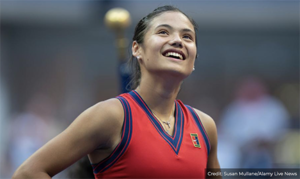
In the end, Radcucanu was the one who held her nerve, despite overwhelming support for her opponent. That must have been unnerving for a player who until then had been the darling of the mainly New York crowds.
You’d think these two youngsters in their maiden Grand Slam final would be riddled with nerves on this huge occasion. Instead, we had a match of scintillating quality, with long, gruelling rallies – a match of extreme tension and a consistently high level of tennis.
19-year-old Canadian Leylah Fernandez versus the 18-year-old British player Emma Raducanu in the US Open Women’s singles final. To say it’s an unlikely scena rio is an understatement. The Men’s final will be contested between Novak Djokovic and Daniil Medvedev, the number one versus the number two seed. Yet in the Women’s we are talking about Fernandez, world number 73 vs Emma Raducanu, the world number 150. It’s almost unimaginable.
rio is an understatement. The Men’s final will be contested between Novak Djokovic and Daniil Medvedev, the number one versus the number two seed. Yet in the Women’s we are talking about Fernandez, world number 73 vs Emma Raducanu, the world number 150. It’s almost unimaginable.
Which means, on paper, Fernandez is the favourite. She’s also beaten four high seeds in consecutive matches. But they’ve each been three-set nailbiters and one would think she must be mentally exhausted. Raducanu, despite having had to qualify, hasn’t lost a single set throughout and will surely be the fresher of the two.
As complete underdogs they’ve both traded on the nerves of their far more experienced opponents. The second-seeded Aryna Sabalenka more or less imploded in her final service game with a couple of wild double faults and splayed groundshots, finally handing the semi-final to Fernandez. Against Raducanu in the other semis, Maria Sakkari repeatedly sent forehands sailing over the baseline, her elbow tight with nerves.
What on earth is going on with Emma Raducanu at the US Open?
The 18-year-old Brit was a wildcard at Wimbledon, ranked just 343 in the world. She got to the fourth round, where she finally dropped her first set of the tournament, before retiring against Ajla Tomljanovic with what appeared to be a panic attack — hardly surprising after the intense press and public scrutiny. Talk about being thrown in at the deep end.
And now she’s doing the same at the US Open in Flushing Meadows — but even better. She not only got through three rounds of qualifying, but has now reached the semi-finals without dropping a set. This makes her the first female qualifier in American tennis history to get to the last four. In fact, the scores in those sets have mostly been a breeze – 6-1, 6-0, 6-2 — and , like many people, I ’ ve been confused as to how this has all been happening.
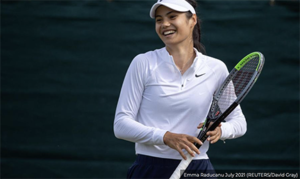 One thing that seems to have helped her is that her opponents appear to have been riddled with nerves against what now seems to be a carefree youngster. She came out onto the main stadium for her match against the home favourite, Shelby Rogers, smiling and waving at the crowd. And then she breezed through in a 6-2, 6-1 whitewash. Rogers had beaten the number one seed, Ashleigh Barty, in the previous round — so this was pretty unexpected. Read More
One thing that seems to have helped her is that her opponents appear to have been riddled with nerves against what now seems to be a carefree youngster. She came out onto the main stadium for her match against the home favourite, Shelby Rogers, smiling and waving at the crowd. And then she breezed through in a 6-2, 6-1 whitewash. Rogers had beaten the number one seed, Ashleigh Barty, in the previous round — so this was pretty unexpected. Read More
Laurel Hubbard, the New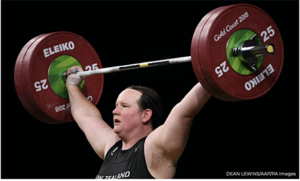 Zealand weightlifter (pictured above), has been picked as the first ever transgender athlete to compete at an Olympics. It has been seen as a highly controversial decision. Hubbard is due to compete in the +87kg women’s weightlifting event next week in Tokyo. If she wins gold, there will no doubt be further outcry and claims from some cis-women weightlifters to the tune of: “ She is stealing our medals. ”
Zealand weightlifter (pictured above), has been picked as the first ever transgender athlete to compete at an Olympics. It has been seen as a highly controversial decision. Hubbard is due to compete in the +87kg women’s weightlifting event next week in Tokyo. If she wins gold, there will no doubt be further outcry and claims from some cis-women weightlifters to the tune of: “ She is stealing our medals. ”
The trans debate in sport is regarded as relatively recent and yet, back in 1977, a player called René e Richards appeared on the pro tennis scene. A spectator thought she recognised that swinging leftie serve coming off the powerful 6 ’ 2” frame and Renée was outed in the press. For she had actually been born Richard Raskin. Raskin had transitioned from male to female and was now playing on the women ’ s tour.
Wimbledon was a fascinating tournament this year, except that it all went out with a bit of a whimper. Matteo Berrettini, the 25-year-old Italian heart-throb, won the initial set at his first Wimbledon Singles Final appearance, polishing off the tie-break with a thunderous serve down the tee. Initially, his opponent seemed a touch nervous. But anyone who thought he was in for a chance at winning the title against Novak Djokovic was dreaming. Novak got his act together and more or less breezed through to the finish line, winning in four sets by 6-7, 6-4, 6-4, 6-3.
Get the Serb on an off-day over the best-of-three sets in a lesser tournament and you might just stand a chance. Dan Evans managed it in Monte Carlo, an event more about the country club’s spectacular scenery and glamorous reputation, where the tennis appears to be somewhat secondary,
Stuff.co.nz
Novak Djokovic believes players don’t get a big enough cut of the revenue from grand slam tournaments.
OPINION: So, Novak Djokovic called a meeting of players to discuss, well we’re not really sure what exactly … there have been rumours of boycotts, breakaway unions and demands for more prize money. Read More
July 2021
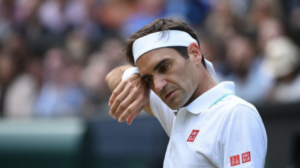
So, Wimbledon 2021 bids farewell to Roger Federer. It was a sad spectacle, really: spraying ground shots, missing easy volleys, being constantly passed and completely outclassed by the Polish player, Hubert Hurkacz, a 6’5” powerhouse whose game belies his gentle and shy nature.
Stuff.co.nz
OPINION: Imagine the scenario. Your name is Naomi Osaka, you’re a teenager, playing a Grand Slam final against Serena Williams, the home player, a legend and firm crowd favourite.
You win the drama-filled match and, as you hold the trophy, some twenty thousand fans are booing you. You pull your visor down over your face to hide your tears and try to
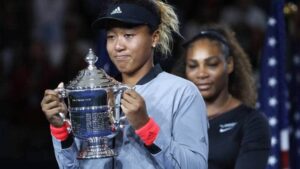 block out the deafening jeers. And then you have to make a winner’s speech in front of this hostile crowd.
block out the deafening jeers. And then you have to make a winner’s speech in front of this hostile crowd.
Katrina Allen March 23, 2021
 Today marks the one year anniversary of the first lockdown. It’s been a year of extraordinary, life-changing events, and one in which many people have only been able to survive by either embarking on entirely new careers or by going remote.
Today marks the one year anniversary of the first lockdown. It’s been a year of extraordinary, life-changing events, and one in which many people have only been able to survive by either embarking on entirely new careers or by going remote.
Ghislaine Hubbard resigned from her job – running the witness service at the Old Bailey – just before lockdown and, having once trained as a graphologist, turned to running online interactive sessions. She now works fewer hours and earns more than before lockdown. But she is well aware that she needs to look to the future and work out how to market herself in real life once restrictions are lifted. “It’s going to be the next big challenge.”
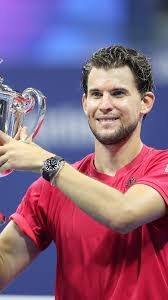
Finally, a Grand Slam event, the first since lockdown, albeit without spectators.
But no Nadal, who was preparing for the French Open on his beloved clay.
And no Federer, who was taking time out to have knee surgery.
So that just left Djokovic out of the top three, and who could beat him, since he hadn’t lost a match this year? Read More
When Katrina Allen left her comfortable London home to volunteer as a translator in Greece, she had no idea how life-changing it would be.
It’s on my sixth night on the Greek island of Samos that things really become tense. I’m at my apartment when the phone beeps: “Get down to the medical centre. There’s a massive fire in the camp.” It turns out that it’s the result of a fight breaking out between Syrians and Afghans over somebody jumping the food queue. Gas canisters are now exploding like bombs, echoing around the hillside. Hundreds are trying to flee the refugee camp, including terrified families with small kids, only to be tear-gassed by the police attempting to contain everyone. Later I’m told that a girl went into labour — thankfully, they managed to get her to hospital. Read More
This article was published in Stuff.co.nz
With Rafael Nadal and Roger Federer choosing not to play, Novak Djokovic decided to travel to New York for the US Open. Here was his golden opportunity to win another Slam and get closer to Federer’s record of 20.
He hadn’t lost a match this year. How could he not win this tournament?
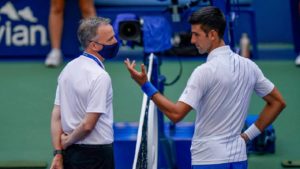
A Great Figurehead in the Field of Sport for the Disabled
Written for Campden Hill LTC
We are sad to inform you all that Liz Dendy, who was our president from the late 90’s until 2012, died two weeks ago at the age of 90 yrs.

